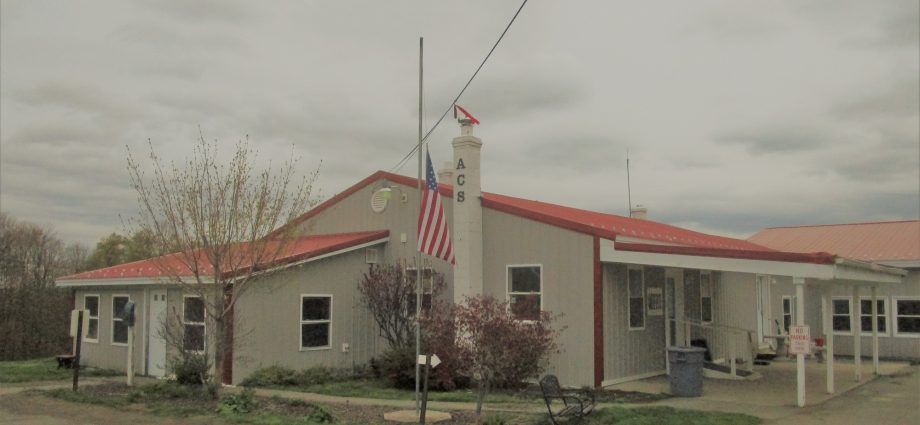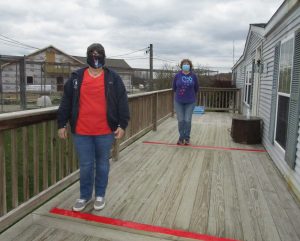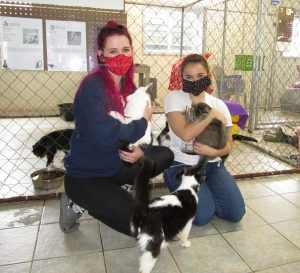ACS veterinarian Debra Urban (above, left) and receptionist Michelle Wood demonstrate some of the safe-distancing measures that have been implemented at the clinic, which will resume spay and neuter operations of cats on Monday. The nearly completed new clinic and kennel is behind them.
Photos and story by Rick Hiduk
(Also published in the Daily Review)
Adoptions and rescues at the Animal Care Sanctuary (ACS) in East Smithfield never slowed down when disaster declarations were issued in association with the COVID-19 health crisis. In fact, fosters and adoptions of cats and dogs are twice what they would normally be at this time of the year. But spay and neuter services performed by veterinarians at the onsite clinic were deemed non-essential and came to a standstill at an inopportune time.
“We’re at the height of kitten season,” ACS executive director Joan Smith-Reese explained. More than 200 spay and neuter appointments scheduled for March and April had to be postponed. And, unfortunately, cats with spring fever don’t wait for appointments.
“A lot of the ones we were going to be doing a month or so ago are already having kittens,” said veterinarian Debra Urban. Even a dozen cats that are not spayed in time will add another 40 or more kittens to a strained system, so staff members hope to get the current mamas into the clinic before they get pregnant again. There also tends to be less person-to-person interaction when dealing with cats – an important consideration as ACS slowly returns to normal.
“We’re calling them back first,” Smith-Reese noted of cat owners. Clinic staff hope to conduct 15 spays and neuters per day during their first few weeks back in operation, beginning May 11, then slowly expand their services to include wellness checks, vaccinations and spaying and neutering of dogs. Simultaneously, construction will resume on a much larger clinic, which could be completed by the end of June and allow ACS to be fully operational again.
“We want to get as many done as we can to reduce the number of kittens we have to find homes for,” Urban explained. “We already anticipate being overwhelmed by more cats than we have the capacity for.” The operation on cats, less than 15 minutes each compared to an average of 30 minutes for dogs, also allows for more animals to be moved through the clinic during this trial stretch of reopening.
Though the clinic schedule is tentatively full through mid June, Smith-Reese said that other pet owners needing basic veterinarian services can be fit in as cancellations occur and should call to get on a waiting list.
Animal fostering and adoption is up at shelters across the country, as idled workers and their families find themselves with more time at home to acclimate new animals. Those interested in adoption during the partial shutdown took to social media and other internet resources, including PetFinder and the ACS website and Facebook page.
When a family or individual see a pet they like, they should fill out the adoption application at www.animalcaresanctuary.org. After making an appointment with ACS staff, one or two people will be invited to the shelter to enter through a clearly marked door and led through an area that can be sanitized between visits and on to the furry friend that caught their fancy online.
By processing the applications in advance, ACS can reduce the number of human visits. “So if they come in and find one they love, they can take them home,” said Smith-Reese. Animal lovers who are not internet savvy can make an appointment to fill out an application in person at ACS, but they will have to wait until the application is approved before they can return.
The philosophy around adoption has changed in recent years, Smith-Reese explained, to help ensure successful adoption and reduce the number of returns. Staff will still verify references listed on the applications, but “It’s more important today to have a long conversation,” she maintained. “We want to know what they are looking for.”
A teenage boy looking for a dog to play ball with, for example, can be more quickly matched with the right pet, as can a stay-at-home grandmother looking for a lap cat. “That conversation is a more efficient way to find that out,” Smith-Reese remarked.
Part of the ACS customer service model also includes a “3-3-3” followup, meaning that shelter staff will contact the adopting family three days, three weeks, and three months after they have taken an animal home to make sure that everything is going alright and to offer advice for any challenges the family or pet are experiencing. “They can call at any time, of course, if there is a problem,” said Smith-Reese.
ACS also conducts a unique barn cat adoption program to reduce the number of feral cats at the shelter. Since feral cats, for which traditional adoption is nearly impossible, bond better with other cats than with humans, they are placed in pairs with eligible patrons who need help eradicating rodents in barns and other outbuildings. The adopters agree to keep the cats inside the structure for at least two weeks, after which they are likely to stick together. According to Becca Morgan, ACS director of feline care, only two cats have been lost out of hundreds adopted – a much higher success rate than that of the average feral feline.
As with the cattery and dog kennels, safe-distancing guidelines will be imposed at the clinic. Not only will visits be staggered to prevent too many people from being onsite or in any area at a given time, plexiglass shields have been installed wherever staff and the public need to interact directly.
Six-foot tape markings lead to the entrance of the clinic to keep people bringing pets safely separated. In the event of inclement weather, patrons will be asked to stay in their vehicles until it is time for them to come in. Masks are required of both staff and guests whenever directly interacting.
As Smith-Reese and her staff prepare for Monday’s soft opening and become excited again for the completion of the new clinic and kennel, they are equally concerned about how the cancellation and postponement of key annual fundraisers will effect donations and possibly prevent them from reaching all of their goals.
Interested readers may call 570-596-2200, log on to www.animalcaresanctuary.org to find out how to contribute online, or send a check to Animal Care Sanctuary, PO Box A, East Smithfield, 18817.
ACS director of feline care Becca Morgan (left) and cattery caregiver Allyson Henry remind animal lovers that there are many friendly felines and cuddly canines currently available for fostering and adoption.


